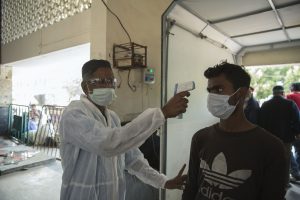Since its reunification amid the ongoing Afghan peace process, Tehreek-e-Taliban Pakistan (TTP) has been carrying out attacks on security forces in the northwestern province of Khyber Pakhtunkhwa. But its latest offensive at Quetta’s Serena Hotel is a worrying sign for the Pakistani state.
For the militant group to carry out a sophisticated car bombing at a luxury hotel — considered to be one of the most secure places in the southwestern province of Balochistan — is a testament to its strong comeback.
For Pakistan’s armed forces, this is a crucial time to combat terrorism before it consumes the country as it did decades ago when uncertainty from across the Pakistan-Afghanistan border spilled over.
This time around, however, Pakistan’s armed forces are on the ground, but for different reasons. Instead of battling militancy, they have been nominated as Pakistan’s frontline warriors in the fight against COVID-19.
Last week, Pakistan’s Prime Minister Imran Khan said in a press conference that the army will be called in to help provincial governments enforce coronavirus restrictions as he ruled out a complete lockdown amid rising infection rate in the country.
The latest wave of the pandemic in Pakistan appears to be deadlier than the first wave of infections that brought down the country’s healthcare system in 2020. With over 137,000 cases and 3,000 deaths so far, April has surpassed the previous highest monthly and daily averages for the pandemic.
There are over 90,000 active cases with at least 5,200 people in critical condition as hospitals across the country run out of beds.
Amid all this, the government has imposed strict restrictions such as shutting down restaurants, gyms, salons, cinemas, shrines, clubs, and other public facilities and limiting market timings. But the compliance level is low as the recommendations continue to fall on deaf ears.
But when the pleas to avoid large gatherings, non-essential outings and mandatory mask mandates are ignored by the country’s top leadership, it is no surprise that the population is desensitized to the threat of new coronavirus variants.
Blatant violations of standard operating procedures for the pandemic is also visible on television, the most influential medium in the country. From morning shows to soaps, special Ramadan transmissions to news programs, it is as if the virus does not exist.
The authorities have not only failed to take appropriate actions but have also been unsuccessful in communicating the seriousness of the latest wave.
In comparison, during the first wave of the pandemic last year, the population was sensitized with clear messaging from the government. The ensuing lockdown helped instill fear and the police were able to enforce SOPs easily.
This time around, complacency has seeped in from top to bottom, paving way for the government to seek deployment of the army to enforce COVID-19 procedures.
It is no secret that the Pakistan army’s authority goes unquestioned whether it is in the corridors of power or the streets. But is exposing soldiers to a deadly virus when the country is facing a resurgence in militant violence a good strategy? Only time will tell.

































